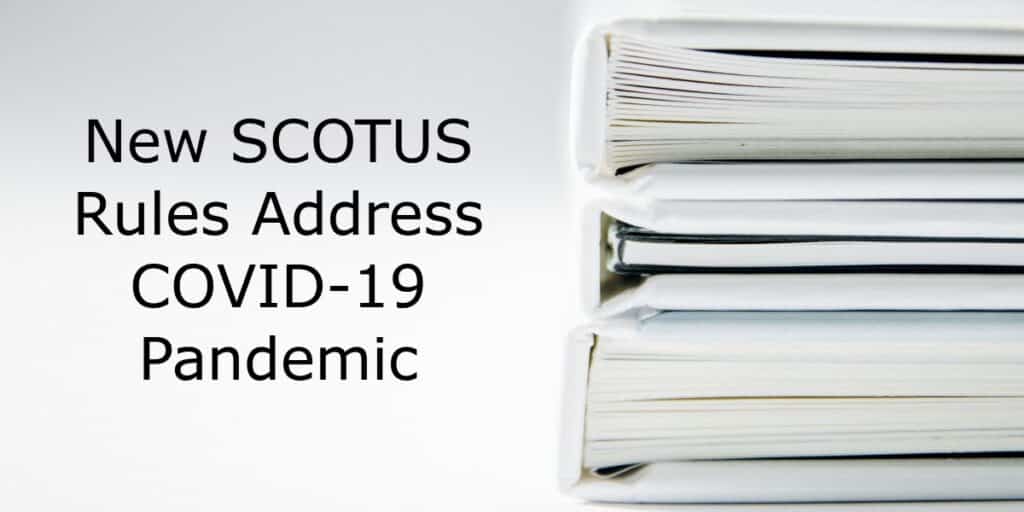New SCOTUS Rules Address COVID-19 Pandemic

When the COVID-19 pandemic restricted court operations in the spring of 2020, the United States Supreme Court put into place some new guidance to keep operations as normal as possible but adjust them to keep all parties safer.
In November 2020, SCOTUS released similar, updated guidance that impacts how documents are filed with the Court.
Here’s a breakdown of this new guidance as it relates to filing of documents:
Modification to Paper Filing
For any document filed in a case prior to a ruling on a petition for writ of certiorari or for an extraordinary writ, or prior to a decision to set a direct appeal for argument, parties only have to file a single paper copy of the document.
This document must be filed on 8 ½ x 11-inch paper and can be formatted under the standards set forth in Rule 33.2 or those in Rule 33.1.
Similarly, single copies of cert-stage amicus briefs and petitions for rehearing may also be filed on 8 ½ x 11-inch paper under the above guidelines.
These new guidelines do not alter any of the requirements for filings in original cases or other cases after a petition for a writ of certiorari has been granted, or a direct appeal has been set for argument.
Additionally, certain categories of documents filed through the Court’s electronic filing system no longer need to be submitted in paper form at all.
These categories include:
- Motions for an extension of time under Rule 30.4
- Waivers of the right to respond to a petition under Rule 15.5
- Blanket consents to the filing of amicus briefs under rules 37.2(a) and 37.3(a)
- Motions to delay distribution of a cert petition under SCOTUS’s March 19, 2020 Order
For the above documents, they should be filed electronically in cases governed by Rule 34.6. For other types of documents in those cases, paper copies should still be the only means of filing.
Those who are not authorized to file documents through SCOTUS’s electronic filing system still must continue to send single copies of their documents.
Agreements on Service
The Court has encouraged parties to reach agreements regarding serving filings through electronic-only means to eliminate the amount of paper service that must take place.
Filing Deadlines
In March 2020, the Court extended the filing deadline for writs of certiorari in all cases to be due on or after the date of that order to 150 days from the date of lower court judgment, order denying discretionary review, or order denying a timely petition for rehearing.
This is the maximum allowable extension by both statute and rule, meaning SCOTUS will not docket any extension requests dealing with cert petitions covered by the March 19, 2020 Order.
That same Order addressed other types of extension requests in existing cert-stage cases. Under the Order, these extension requests will be granted by the Clerk of the Court’s office when the request is reasonable and based upon COVID-related difficulties.
Document Delivery to the Clerk’s Office
Filings that need to be hand-delivered to the Supreme Court Building should be directed to the North Drive on Second Street. This allows for these hand-delivered filings to be screened offsite before being delivered to the Clerk’s Office.
Additionally, the Court’s policy of same-day delivery of documents that are dropped off prior to 2 p.m. has been suspended to allow for additional screening.
Instead, it may take up to two days for documents arriving at North Drive to be delivered to the Clerk’s Office, so parties are strongly encouraged to send filings by mail or commercial carrier instead of hand-delivery.
Torri’s Legal Aids Successful Service to SCOTUS During COVID-19
At Torri’s Legal Services, we have lots of experience successfully delivering documents to SCOTUS during “normal” times, but the past year has allowed us to adjust to the Court’s new rules.
Recently, we helped with repeated hand-delivery of documents in a case that went before SCOTUS.
Here’s what our client had to say about TLS’s help with their case:
“During the COVID-19 pandemic, our case South Bay United Pentecostal Church v. Newsom twice made its way to the Supreme Court on an emergency basis. In that fast-paced litigation, we were often writing lengthy legal briefs overnight, which then had to be hand-delivered to the Supreme Court. To make sure that everything was handled properly, we relied on Torri’s Legal Services to get our briefs into the Justices’ hands, and with their help obtained a 6-3 decision in our clients’ favor. We don’t know the next time we’ll need to apply for emergency relief from the Supreme Court, but when that time comes, we’ll call Torri’s Legal Services.”
Do you need service to SCOTUS? Contact Torri today for a quote!
